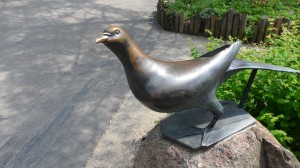 Thursday was the 97th anniversary of the extinction of the passenger pigeon – once the commonest bird in the world and now a distant memory.
Thursday was the 97th anniversary of the extinction of the passenger pigeon – once the commonest bird in the world and now a distant memory.
The Independent newspaper published an article by me on the subject (click here) and regular readers will know I have a bit of a thing about passenger pigeons (click here, here, here).
Losing any species from this planet is significant but some are more significant than others. And I just find the fact that we allowed the commonest bird on the planet to be extirpated, and fairly recently too, to be stunning.
It reminds me of these words of John Donne:
No man is an Island, entire of itself; every man is a piece of the Continent, a part of the main; if a clod be washed away by the sea, Europe is the less, as well as if a promontory were, as well as if a manor of thy friends or of thine own were; any man’s death diminishes me, because I am involved in Mankind; And therefore never send to know for whom the bell tolls; It tolls for thee.
It’s good to know that a large group of USA organisations (see below), and some outside of the USA, have plans to mark the centenary of the passing of the passenger pigeon in 2014. See the beginnings of the Passenger Pigeon Project website here.
I wonder what the rest of the world ought to be doing? An international bird conservation day? A minute’s silence across the world? 7 billion people all shout ‘Passenger Pigeon!’ at the tops of their voices at midday in their country and in their language? Everyone wears a passenger pigeon badge for the day? What’s your suggestion?
And I could imagine that learned societies might use this anniversary to have scientific meetings discussing the solutions to this extinction crisis. I wonder, for example, whether the Royal Society has anything planned?
List of participating organisations:
Academy of Natural Sciences, Philadelphia PA
Aldo Leopold Foundation, Baraboo WI
Amos Butler Audubon Society, Indianapolis, IN
Ball State University, Muncie, IN
Canadian Museum of Science, Ottawa, ON
Center for Humans and Nature, Chicago IL
Chippewa Nature Center, Midland, MI
Cincinnati Zoo and Botanical Gardens, Cincinnati OH
Cleveland Museum of Natural History, Cleveland OH
Cornell University, Department of Art, Ithaca, NY
Cornell University, Laboratory of Ornithology, Ithaca, NY
Fenner Nature Center, Lansing, MI
Friends of Ryerson Woods, Riverwoods, IL
Grand Valley State University, Allendale, MI
Harbor Springs Area Historical Society and Harbor Springs History Museum, Harbor Springs, MI
Illinois Audubon Society, Springfield, IL
Illinois Natural History Survey, Champaign, IL
Illinois State Museum, Springfield, IL
Indiana State Museum, Indianapolis, IN
Indiana University-Purdue University, Indianapolis, IN
Indiana Department of Natural Resources, Indianapolis, IN
International Crane Foundation, Baraboo, WI
Jahangirnagar University, Savar, Bangladesh
Bell Museum of the University of Minnesota, Minneapolis, MN
Kalamazoo Nature Center, Kalamazoo, MI
Kingman Museum, Battle Creek, MI
Lakeshore Museum Center, Muskegon, MI
Leigh Yawkey Woodson Art Museum, Wausau, WI
Love Creek Nature Center, Niles, MI
Massachusetts Audubon Society, Lincoln, MA
Michigan Department of Natural Resources, Lansing, MI
Michigan State University Museum, East Lansing, MI
National Audubon Society, New York, NY
National Council for Science and the Environment, Washington DC
Ohio Department of Natural Resources, Columbus, OH
Ohio Historical Society, Columbus, OH
Peabody Museum, Yale University, New Haven, CT
Peggy Notebaert Nature Museum/ Chicago Academy of Sciences, Chicago, IL
Castle Museum of Saginaw County History, Saginaw, MI
Smithsonian Institution, Washington DC
Universidad Nacional de Cordoba, Cordoba, Argentina
University of the Arts, Philadelphia, PA
University of Louisiana at Lafayette, Lafayette, LA
University of Illinois (Chicago), Chicago, IL
University of Wisconsin-Madison, Madison, WI
Wesleyan University, Middletown, CT
Wisconsin Society for Ornithology, Madison, WI
Wisconsin State Historical Society, Madison, WI
Xavier University, Cincinnati, OH
[registration_form]
A sage bloke, that John Donne… 😉
While this is a sad thing, especially because ofthe birds’ extraordinary usefulness, this gives me great hope for starlings. As the second most populous bird in the US, they are the most pestilent, useless and bully of a bird there ever was.
Janet – welcome to this blog! i was struck by how common starlings are in the USA – from Central Park, NYC to Yellowstone NP and all stops in between! We’ll have them back please – as they are declining in Europe – if you take Canada geese back with you. Deal?
Janet, birds do not have to be “of use” to have a value in their own right they just are. I for one am unhappy that I will never see a passenger pigeon or any of the other species we have driven to extinction bird or otherwise. Each one gone makes this world a little poorer. As to the Starling, I must admit to liking them, but if I didn’t they still have every right to be here, even in the US where of course We took them. The most pestilent thing on the planet is of course ourselves.
and, Janet, you are welcome to all our Grey Squirrels, too